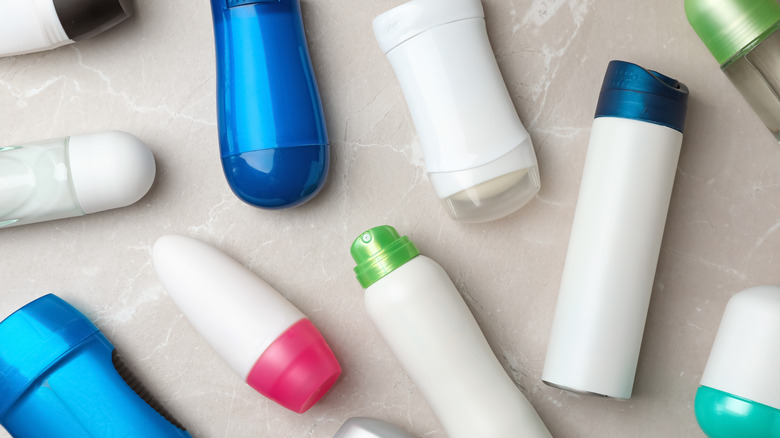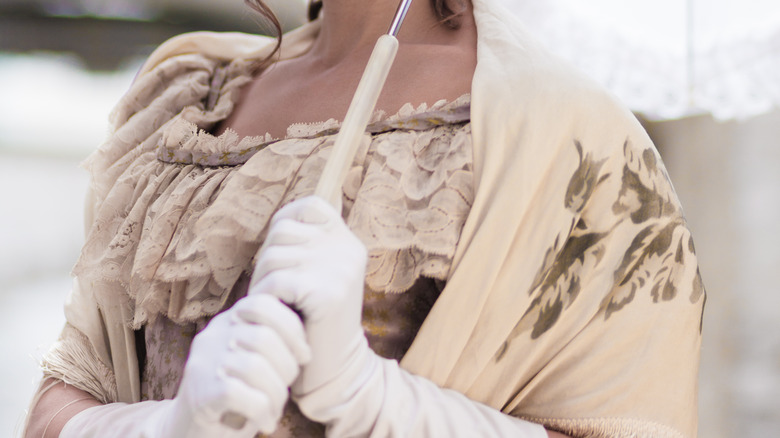Who Invented Deodorant And Antiperspirant?
Let's be honest: People are gross. They pick their noses and then use their booger hands to hold the door for you on the way out of the restaurant. They cough on their food without covering their mouths and then reach for the salt, use it, scratch their ears, and then pass you the salt. They leave the bathroom without washing their hands and then walk over to you and shake your hand and pretend that they don't know how gross they are. Oh yes, and they smell. In that little crevasse under the arm where sweat bubbles and puddles things get real gnarly, real quick. Unless, of course, you're a civilized, rational ape with the good sense to suppress the disgust you exude by applying a paste, liquid, spray, etc., to your armpits. For God's sake, people, use deodorant!
Ahem. Let's just be glad that we live in an era where human disgust suppressants exist. Before a mere 135 years ago or so, civilization certainly smelled a whole lot worse. As Smithsonian Magazine tells us, the first deodorant — Mum — hit the market in 1888. The world's first antiperspirant, Everday, came 15 years later in 1903. But it was Cincinnati teenager Edna Murphey who changed the world from smelly to florally scented after trying her father Abraham's anti-slip tool on her own sweaty armpits in 1910. Fast forward three years and Murphey's antiperspirant Odorono earned $65,000 (over $2 million in 2023) and got shipped all over the world.
Mum's the word on body odor
Before the days of deodorant and antiperspirant, folks did have a standard odor-masking solution: perfumes. For thousands of years perfumes, body oils, and such fell under the general category of health and beauty. Ancient Egyptians were big into perfume and employed hygienic regimes that mirror our own, including everything from exfoliation to eyeliner. Fast forward to medieval Europe and folks did the same thing.
Modern, chemical deodorizers were only possible through scientific advancement. And so it was that the world's first deodorant, Mum, was born in 1888. According to Oars + Alps, Mum was a "waxy cream" that used zinc oxide as its chief ingredient. As a cream, it would have been rubbed into the armpit using your fingertips. Lake Forest College says that Mum worked both for armpits and feet and came in "small tins" — and the name came from the brand's slogan, "Mum's the word."
But deodorants don't prevent the flow of sweat. It took all the way until 1903 for the world's first antiperspirant to come out, appropriately named Everdry. Abraham Murphey developed his own type of antiperspirant shortly after in 1909 to help him conduct surgery, and his teenage daughter Edna discovered that if she put some under her arm she smelled less. This makes sense because even if an antiperspirant doesn't deodorize, it prevents sweating — and body odor comes from the mingling of sweat and skin bacteria.
Post-Victorian prudence and suspicion
Historian Juliann Silvulka told Smithsonian Magazine that early 20th-century society was "still very much ... Victorian." Deodorant and antiperspirant were a hard sell to a public that found discussions of the body off-putting. So when teenager Edna Murphey launched her 1910 product Odorono — "Odor? Oh No!" — it wasn't an immediate success. Notably, Odorono could irritate the skin in the armpit and ruin fabric — even turning it red — because of its active ingredient, aluminum chloride. And so, Murphey advised women not to shave before using it and suggested applying it before bed so it could soak into the skin overnight and dry by morning.
Yet Odorno floundered from 1910 to 1912. After borrowing $150 from her grandfather to start Odorono, Murphey had to run the business from her family's basement because she couldn't make rent for her office. Her door-to-door saleswomen failed, and loads of Odorono stock got returned. It took the shrewd marketing of copywriter James Young to shoot Odorono into the mainstream. In 1912 Young launched a marketing campaign framing body odor as an "embarrassing medical ailment." Per Cosmetics + Toiletries, advertisements from the time included a longform testimonial about "the most humiliating moment of my life" upon learning about "the cause of my unpopularity among men." The shame worked, and deodorants and antiperspirants became bathroom staples the world over.

